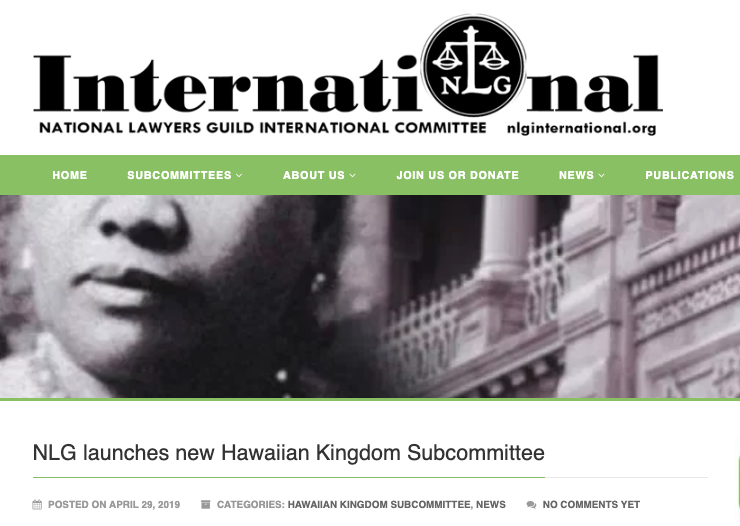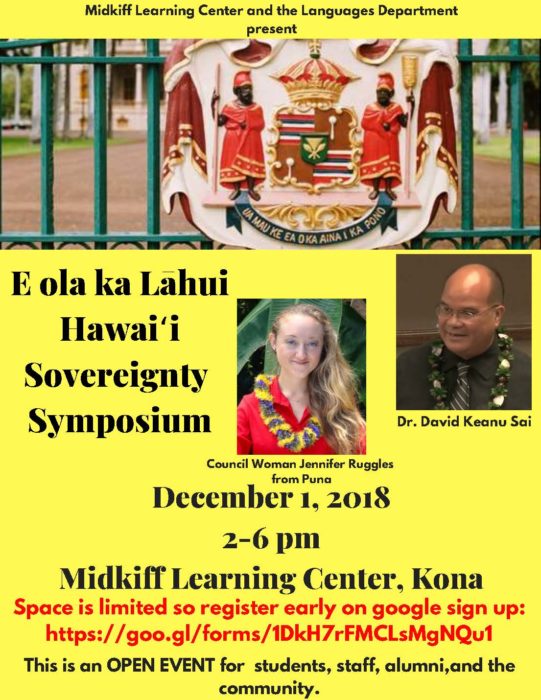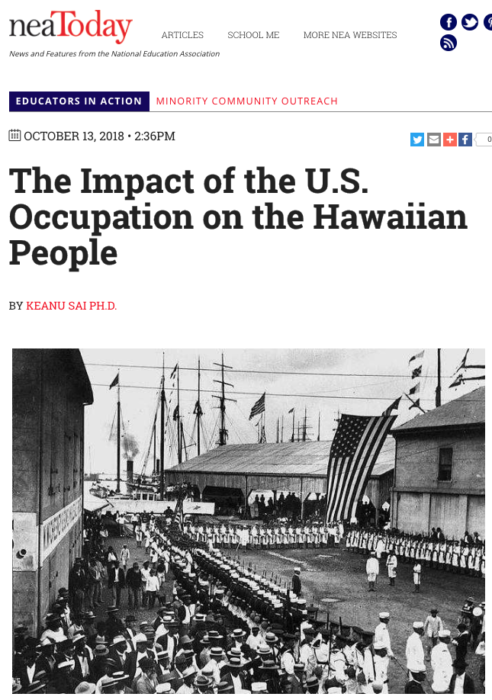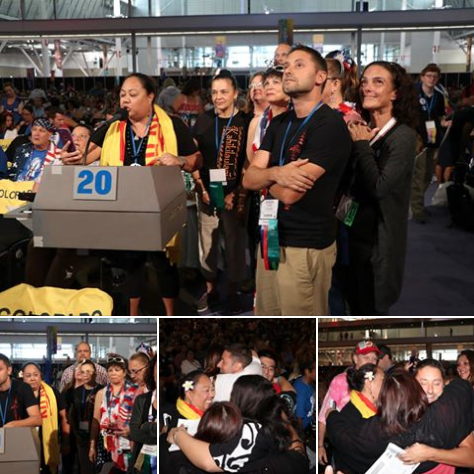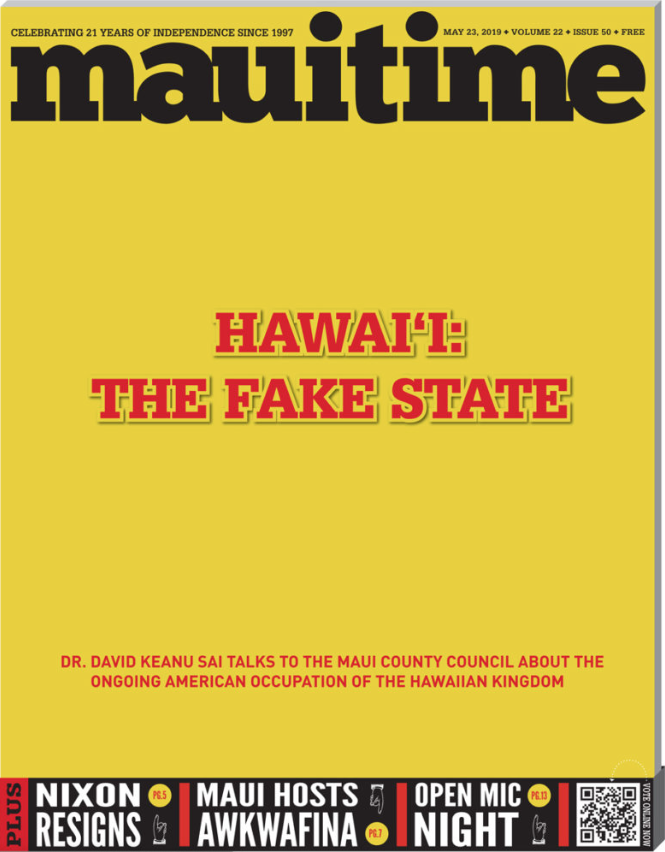
Category Archives: International Law
Video of Dr. Keanu Sai’s Presentation to the Maui County Council on the status of the Hawaiian Kingdom under International Law
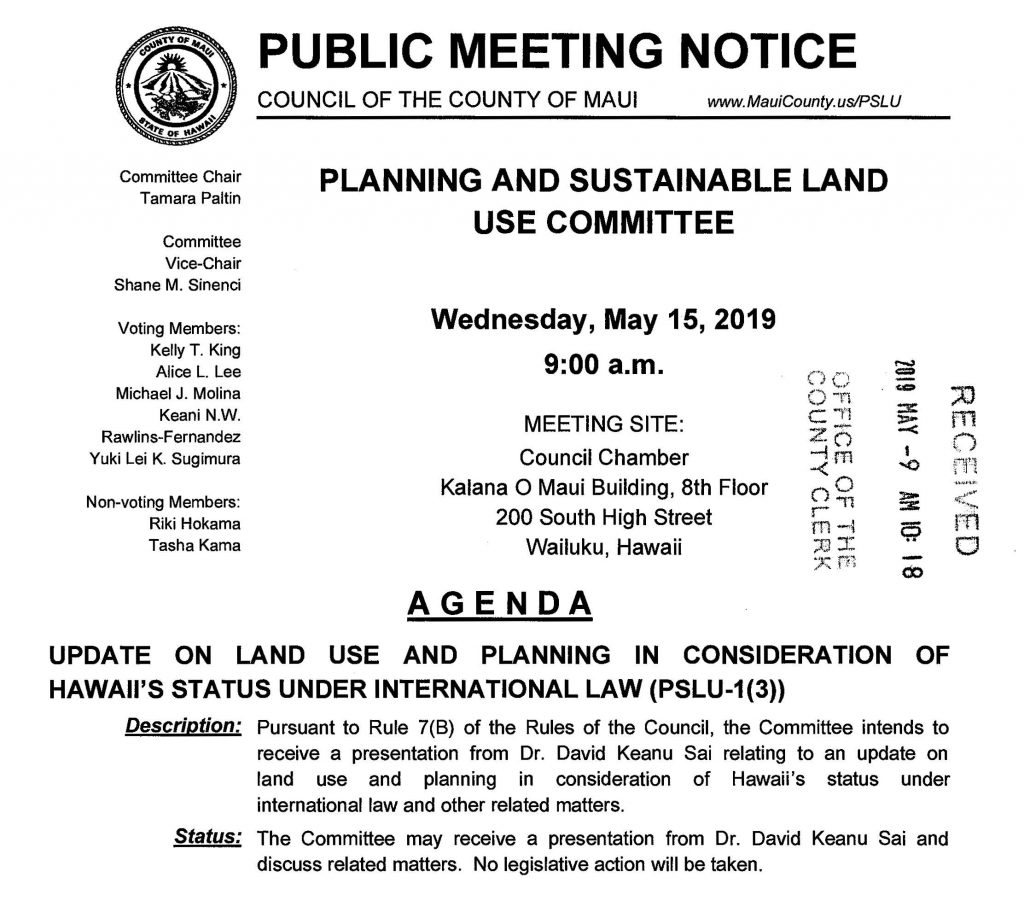
Dr. Keanu Sai to Present to Maui County Council May 15, 2019

National Lawyers Guild Acknowledges Hawai‘i is Illegally Occupied
At the International Committee weekend retreat in the Bay Area in March 2019, the IC launched a new subcommittee, the Hawaiian Kingdom Subcommittee. Read on to learn more about the subcommittee’s work. To reach out or join the subcommittee, contact co-chairs Martha Schmidt, Keanu Sai and Steve Laudig.
There is a common misconception that the Hawaiian Islands comprise United States territory as its political subdivision, the State of Hawai‘i. The Hawaiian Islands is the territory of the Hawaiian Kingdom. In Larsen v. Hawaiian Kingdom, the Permanent Court of Arbitration recognized “that in the nineteenth century the Hawaiian Kingdom existed as an independent State recognized as such by the United States of America, the United Kingdom and various other States (Award, para. 7.4).” By 1893, the Hawaiian Kingdom maintained over 90 embassies and consulates throughout the world and entered into treaty relations with other countries to include the United States.
The lack of any US congressional constitutional authority to annex a foreign country without a treaty was noted in a 1988 memorandum by the Office of Legal Counsel, U.S. Department of Justice, which questioned whether Congress was empowered to enact a domestic law annexing the Hawaiian State in 1898. Its author, Douglas Kmiec, cited constitutional scholar Westel Willoughby who had written: “The constitutionality of the annexation of Hawaii, by a simple legislative act, was strenuously contested at the time both in Congress and by the press. The right to annex by treaty was not denied, but it was denied that this might be done by a simple legislative act. … Only by means of treaties, it was asserted, can the relations between States be governed, for a legislative act is necessarily without extraterritorial force—confined in its operation to the territory of the State by whose legislature it is enacted.” Since 1898, the United States have been imposing American municipal laws over the territory of the Hawaiian Kingdom in violation of international humanitarian law.
On February 25, 2018, Dr. Alfred M. deZayas, a United Nations Independent Expert, sent a communication to State of Hawai‘i judges stating: “I have come to understand that the lawful political status of the Hawaiian Islands is that of a sovereign nation-state in continuity; but a nation-state that is under a strange form of occupation by the United States resulting from an illegal military occupation and a fraudulent annexation. As such, international laws (the Hague and Geneva Conventions) require that governance and legal matters within the occupied territory of the Hawaiian Islands must be administered by the application of the laws of the occupied state (in this case, the Hawaiian Kingdom), not the domestic laws of the occupier (the United States).”
The Hawaiian Kingdom Subcommittee provides legal support to the movement demanding that the U.S., as the occupier, comply with international humanitarian and human rights law within Hawaiian Kingdom territory, the occupied. This support includes organizing delegations and working with the United Nations, the International Committee of the Red Cross, and NGOs addressing U.S. violations of international law and the rights of Hawaiian nationals and other Protected Persons.
For a historical and legal overview of the Hawaiian Kingdom situation see: Dr. Keanu Sai’s three articles on the Hawaiian Kingdom published by the National Education Association; and, Professor Matthew Craven’s legal brief on Hawaiian Kingdom’s continuity as a State under international law cited by Judge James Crawford in his The Creation of States in International Law (2d ed.).
The National Lawyers Guild was established in 1937 as an association equal in standing to the American Bar Association.
New Documentary: Speaking Truth to Power
Investigating the Illegal U.S. Military Occupation of the Hawaiian Islands
From Integrative Media Co-operative (IMC):
IMC would like to continue documenting up and coming events and actions regarding the U.S. military occupation of the Hawaiian Kingdom. IMC relies on public donations. To donate visit IMC’s Indiegogo crowdfunding campaign: Speaking Truth to Power – Documentary. Or contact IMC directly at integrative.media.coop@gmail.com.
Please subscribe to IMC’s YouTube channel, Integrative Media Co-operative, to stay updated on future projects. There are many short videos coming soon regarding this topic.
Most importantly, sharing this video with friends and family brings a greater awareness to this ongoing and evolving situation.
126 Years Ago Today: U.S. Invasion of Hawai‘i
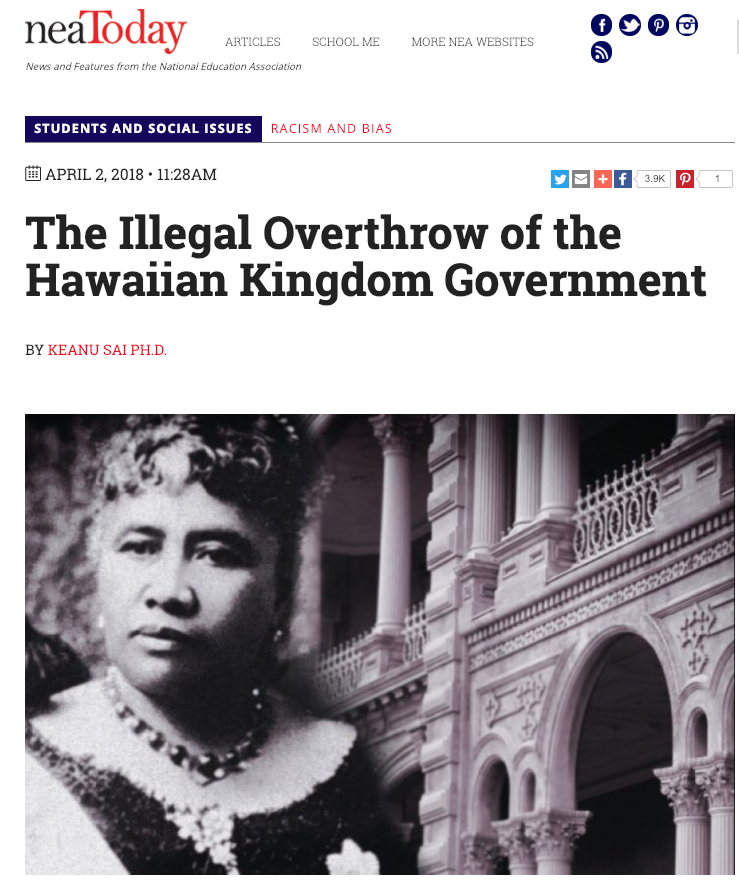
Status of the Hawaiian Kingdom under International Law
In 2001, the Permanent Court of Arbitration’s arbitral tribunal, in Larsen v. Hawaiian Kingdom, declared “in the nineteenth century the Hawaiian Kingdom existed as an independent State recognized as such by the United States of America, the United Kingdom and various other States, including by exchanges of diplomatic or consular representatives and the conclusion of treaties (paragraph 7.4).” The terms State and Country are synonymous.
As an independent State, the Hawaiian Kingdom entered into extensive treaty relations with a variety of States establishing diplomatic relations and trade agreements. The Hawaiian Kingdom entered into three treaties with the United States: 1849 Treaty of Friendship, Commerce and Navigation; 1875 Commercial Treaty of Reciprocity; and 1883 Convention Concerning the Exchange of Money Orders. In 1893 there were only 44 independent and sovereign States, which included the Hawaiian Kingdom, as compared to 197 today.
On January 1, 1882, it joined the Universal Postal Union. Founded in 1874, the UPU was a forerunner of the United Nations as an organization of member States. Today the UPU is presently a specialized agency of the United Nations.
By 1893, the Hawaiian Kingdom maintained over ninety Legations and Consulates throughout the world. In the United States of America, the Hawaiian Kingdom manned a diplomatic post called a legation in Washington, D.C., which served in the same function as an embassy today, and consulates in the cities of New York, San Francisco, Philadelphia, San Diego, Boston, Portland, Port Townsend and Seattle. The United States manned a legation in Honolulu, and consulates in the cities of Honolulu, Hilo, Kahului and Mahukona.
“Traditional international law was based upon a rigid distinction between the state of peace and the state of war (p. 45),” says Judge Greenwood in his article “Scope of Application of Humanitarian Law” in The Handbook of the International Law of Military Occupations (2nd ed., 2008), “Countries were either in a state of peace or a state of war; there was no intermediate state (Id.).” This is also reflected by the fact that the renowned jurist of international law, Professor Lassa Oppenheim, separated his treatise on International Law into two volumes, Vol. I—Peace, and Vol. II—War and Neutrality.
Presidential Investigation of the Overthrow of the Hawaiian Government
On January 16, 1893, United States troops invaded the Hawaiian Kingdom without just cause, which led to a conditional surrender by the Hawaiian Kingdom’s executive monarch, Her Majesty Queen Lili‘uokalani, the following day. Her conditional surrender read:
“I, Liliuokalani, by the grace of God and under the constitution of the Hawaiian Kingdom, Queen, do hereby solemnly protest against any and all acts done against myself and the constitutional Government of the Hawaiian Kingdom by certain persons claiming to have established a provisional government of and for this Kingdom.
That I yield to the superior force of the United States of America, whose minister plenipotentiary, His Excellency John L. Stevens, has caused United States troops to be landed at Honolulu and declared that he would support the said provisional government.
Now, to avoid any collision of armed forces and perhaps the loss of life, I do, under this protest, and impelled by said force, yield my authority until such time as the Government of the United States shall, upon the facts being presented to it, undo the action of its representatives and reinstate me in the authority which I claim as the constitutional sovereign of the Hawaiian Islands.”
In response to the Queen’s conditional surrender of her authority, President Grover Cleveland initiated an investigation on March 11, 1893, with the appointment of Special Commissioner James Blount whose duty was to “investigate and fully report to the President all the facts [he] can learn respecting the condition of affairs in the Hawaiian Islands, the causes of the revolution by which the Queen’s Government was overthrown, the sentiment of the people toward existing authority, and, in general, all that can fully enlighten the President touching the subjects of [his] mission.” After arriving in the Hawaiian Islands, he began his investigation on April 1, and by July 17, the fact-finding investigation was complete with a final report. Secretary of State Walter Gresham was receiving periodic reports from Special Commissioner Blount and was preparing a final report to the President.
On October 18, 1893, Secretary of State Gresham reported to the President, the “Provisional Government was established by the action of the American minister and the presence of the troops landed from the Boston, and its continued existence is due to the belief of the Hawaiians that if they made an effort to overthrow it, they would encounter the armed forces of the United States.” He further stated that the “Government of Hawaii surrendered its authority under a threat of war, until such time only as the Government of the United States, upon the facts being presented to it, should reinstate the constitutional sovereign, and the Provisional Government was created ‘to exist until terms of union with the United States of America have been negotiated and agreed upon (p. 462).’” Gresham then concluded, “Should not the great wrong done to a feeble but independent State by an abuse of the authority of the United States be undone by restoring the legitimate government? Anything short of that will not, I respectfully submit, satisfy the demands of justice (p. 463).”
Investigation Concludes United States Committed Acts of War against the Hawaiian Kingdom
One month later, on December 18, 1893, the President proclaimed by manifesto, in a message to the United States Congress, the circumstances for committing acts of war against the Hawaiian Kingdom that transformed a state of peace to a state of war on January 16, 1893. Black’s Law Dictionary defines a war manifesto as a “formal declaration, promulgated…by the executive authority of a state or nation, proclaiming its reasons and motives for…war.” And according to Professor Oppenheim in his seminal publication, International Law, vol. 2 (1906), a “war manifesto may…follow…the actual commencement of war through a hostile act of force (p. 104).”
Addressing the unauthorized landing of United States troops in the capital city of the Hawaiian Kingdom, President Cleveland stated, “on the 16th day of January, 1893, between four and five o’clock in the afternoon, a detachment of marines from the United States steamer Boston, with two pieces of artillery, landed at Honolulu. The men, upwards of 160 in all, were supplied with double cartridge belts filled with ammunition and with haversacks and canteens, and were accompanied by a hospital corps with stretchers and medical supplies (p. 451).”
President Cleveland ascertained that this “military demonstration upon the soil of Honolulu was of itself an act of war, unless made either with the consent of the Government of Hawaii or for the bona fide purpose of protecting the imperiled lives and property of citizens of the United States. But there is no pretense of any such consent on the part of the Government of the Queen, which at that time was undisputed and was both the de facto and the de jure government. In point of fact the existing government instead of requesting the presence of an armed force protested against it (p. 451).” He then stated, “a candid and thorough examination of the facts will force the conviction that the provisional government owes its existence to an armed invasion by the United States (p. 454).”
“War begins,” says Professor Wright in his article “Changes in the Conception of War,” American Journal of International Law, vol. 18 (1924), “when any state of the world manifests its intention to make war by some overt act, which may take the form of an act of war (p. 758).” According to Professor Hall in his book International Law (4th ed., 1895), the “date of the commencement of a war can be perfectly defined by the first act of hostility (p. 391).”
The President also determined that when “our Minister recognized the provisional government the only basis upon which it rested was the fact that the Committee of Safety had in the manner above stated declared it to exist. It was neither a government de facto nor de jure (p. 453).” He unequivocally referred to members of the so-called Provisional Government as insurgents, whereby he stated, and “if the Queen could have dealt with the insurgents alone her course would have been plain and the result unmistakable. But the United States had allied itself with her enemies, had recognized them as the true Government of Hawaii, and had put her and her adherents in the position of opposition against lawful authority. She knew that she could not withstand the power of the United States, but she believed that she might safely trust to its justice.” He then concluded that by “an act of war, committed with the participation of a diplomatic representative of the United States and without authority of Congress, the Government of a feeble but friendly and confiding people has been overthrown (p. 453).”
“Act of hostility unless it be done in the urgency of self-preservation or by way of reprisals,” according to Hall, “is in itself a full declaration of intent [to wage war] (p. 391).” According to Professor Wright in his article “When does War Exist,” American Journal of International Law, vol. 26(2) (1932), “the moment legal war begins…statutes of limitation cease to operate (p. 363).” He also states that war “in the legal sense means a period of time during which the extraordinary laws of war and neutrality have superseded the normal law of peace in the relations of states (Id.).”
Unbeknownst to the President at the time he delivered his message to the Congress, a settlement, through executive mediation, was reached between the Queen and United States Minister Albert Willis in Honolulu. The agreement of restoration, however, was never implemented. Nevertheless, President Cleveland’s manifesto was a political determination under international law of the existence of a state of war, of which there is no treaty of peace. More importantly, the President’s manifesto is paramount and serves as actual notice to all States of the conduct and course of action of the United States. These actions led to the unlawful overthrow of the government of an independent and sovereign State. When the United States commits acts of hostilities, the President, says Associate Justice Sutherland in his book Constitutional Power and World Affairs (1919), “possesses sole authority, and is charged with sole responsibility, and Congress is excluded from any direct interference (p. 75).”
According to Representative Marshall, before later became Chief Justice of the U.S. Supreme Court, in his speech in the House of Representatives in 1800, the “president is the sole organ of the nation in its external relations, and its sole representative with foreign nations. Of consequence, the demand of a foreign nation can only be made of him (Annals of Congress, vol. 10, p. 613).” Professor Wright in his book The Control of American Foreign Relations (1922), goes further and explains that foreign States “have accepted the President’s interpretation of the responsibilities [under international law] as the voice of the nation and the United States has acquiesced (p. 25).”
Despite the unprecedented prolonged nature of the illegal occupation of the Hawaiian Kingdom by the United States, the Hawaiian State, as a subject of international law, is afforded all the protection that international law provides. “Belligerent occupation,” concludes Judge Crawford in his book The Creation of States in International Law (2nd ed., 2006), “does not affect the continuity of the State, even where there exists no government claiming to represent the occupied State (p. 34).” Without a treaty of peace, the laws of war and neutrality would continue to apply.
Addressing Americanization by the Hawaiian Council of Regency
The seventeenth of January will mark 126 years of the United States’ belligerent occupation of the Hawaiian Kingdom. This outcome was initiated by “acts of war” committed by U.S. forces when the U.S. diplomat ordered an invasion on January 16, 1893, which led to the unlawful overthrow of the Hawaiian Kingdom government on January 17th.[1] President Grover Cleveland, in his manifesto to the Congress on December 18, 1893, acknowledged that a “substantial wrong has thus been done which a due regard for our national character as well as the rights of the injured people requires we should endeavor to repair.”[2]
Instead of restoring the Hawaiian government under Queen Lili‘uokalani and repairing the “rights of the injured people,” the United States embarked on a history of deception, lies, the establishment of 118 military installations, and international crimes committed against civilians within Hawaiian territory. These injustices led to the restoration of the Hawaiian government, in situ, in 1995, in similar fashion to the formation of governments in exile during World War II under the doctrine of necessity, and to the Larsen v. Hawaiian Kingdom arbitration, which sought to address the rights of one of those “injured people,” Lance Paul Larsen, a Hawaiian subject. Mr. Larsen was subjected to an unfair trial, unlawful confinement and pillaging by the State of Hawai‘i. These are violations of the 1907 Hague Convention, IV, and the 1949 Geneva Convention, IV, which are considered war crimes.
Lance Paul Larsen v. the Hawaiian Kingdom
The dispute centered on the allegation by Mr. Larsen that the Hawaiian government was liable for “allowing the unlawful imposition of American municipal laws over [him] within the territorial jurisdiction of the Hawaiian Kingdom.” What Mr. Larsen had to overcome was whether he could proceed to hold the Hawaiian government liable for the violation of his rights without the participation of the United States who was the entity that allegedly violated his rights.
On March 3, 2000, a meeting was held in Washington, D.C., with Mr. John Crook from the U.S. State Department, Dr. Sai as Agent for the Hawaiian government, and Ms. Ninia Parks, counsel for Mr. Larsen, where the United States was formally invited to join in the arbitration. A few weeks later, the United States notified the Permanent Court of Arbitration (“PCA”) that it will not join in the proceedings but they asked permission from the Hawaiian government and Mr. Larsen if it could have access to all pleadings and records of the case. Permission was granted. For Mr. Larsen, this gave rise to the indispensable third-party rule and whether or not he could proceed against the Hawaiian government without the participation of the United States. Unlike national courts, international courts do not have subpoena powers.
The Larsen Tribunal eventually ruled that the United States was an indispensable third-party, and without its participation in the proceedings, the Tribunal could not determine what rights of Mr. Larsen were violated by the United States in order to hold the Hawaiian government accountable for the violation of those rights. The Tribunal, however, did state in its decision that the parties could pursue fact-finding through a commission of inquiry under the jurisdiction of the PCA whenever it may enter into an agreement to do so. Fact-finding is not affected by the indispensable third-party rule, which operates in similar fashion to a United States grand jury.
After the last day of the Larsen hearings were held at the PCA on December 11, 2000, the Council, was called to an urgent meeting by Dr. Jacques Bihozagara, Ambassador for the Republic of Rwanda assigned to Belgium. Ambassador Bihozagara had been attending a hearing before the International Court of Justice on December 8, 2000, (Democratic Republic of the Congo v. Belgium), where he became aware of the Hawaiian arbitration case at the PCA.
The following day, the Council, which included Dr. Sai, as Agent, and two Deputy Agents, Peter Umialiloa Sai, acting Minister of Foreign Affairs, and Mrs. Kau‘i P. Sai-Dudoit, formerly known as Kau‘i P. Goodhue, acting Minister of Finance, met with Ambassador Bihozagara in Brussels, Belgium.[3] In that meeting, Ambassador Bihozagara explained, that since he accessed the pleadings and records of the Larsen case on December 8, he had been in communication with his government. This prompted the meeting where he conveyed to Dr. Sai, as Chairman of the Council and agent in the Larsen case, that his government was prepared to bring to the attention of the United Nations General Assembly the prolonged occupation of the Hawaiian Kingdom by the United States.
After careful deliberation, the Council decided that it could not, in good conscience, accept this offer. The Council felt the timing was premature because Hawai‘i’s population remained ignorant of Hawai‘i’s profound legal position due to institutionalized denationalization—Americanization by the United States. Therefore, on behalf of the Council, Dr. Sai graciously thanked Ambassador Bihozagara for his government’s offer but stated that the Council first needed to address over a century of this denationalization. After an exchange of salutations, the meeting came to an end, and the Council returned that afternoon to The Hague.
Exposure of the Continuity of the Hawaiian Kingdom through the medium of Education
The decision by the Council to forego Ambassador Bihozagara’s invitation was made in line with section 495—Remedies of Injured Belligerent, United States Army FM-27-10, which states, “In the event of violation of the law of war, the injured party may legally resort to remedial action of the following types: a. Publication of the facts, with a view to influencing public opinion against the offending belligerent.”[4] Publication of the facts was the means the Council would focus its attention on to expose the prolonged occupation of the Hawaiian Kingdom and the circumstances of the Larsen case.
“When a well packaged web of lies has been sold to the masses over generations, the truth will seem utterly preposterous, and its speaker, a raving lunatic.” -Donald James Wheal
The belligerent occupation of the Hawaiian Kingdom by the United States rests squarely within the regime of the law of occupation in international humanitarian law. The application of the regime of occupation law “does not depend on a decision taken by an international authority”,[5] and “the existence of an armed conflict is an objective test and not a national ‘decision.’”[6] According to Article 42 of the 1907 Hague Convention, IV, a State’s territory is considered occupied when it is “actually placed under the authority of the hostile army.”
Article 42 has three requisite elements: (1) the presence of a foreign State’s forces; (2) the exercise of authority over the occupied territories by the foreign State or its proxy; and (3) the non-consent by the occupied State. U.S. President Grover Cleveland’s aforementioned manifesto to the Congress, which is Annexure 1 in the Larsen v. Hawaiian Kingdom Award, and the continued U.S. presence today without a treaty of peace firmly meets all three elements of Article 42. Hawai‘i’s people, however, have become denationalized and the history of the Hawaiian Kingdom has been, for all intents and purposes, obliterated since the United States’ takeover.
The Council needed to explain to Hawai‘i’s people that before the Permanent Court of Arbitration (“PCA”) could facilitate the formation of the Larsen tribunal the PCA had to ensure that it possessed “institutional jurisdiction.”[7] This jurisdiction required that the Hawaiian Kingdom be an existing “State.” This finding authorized the Hawaiian Kingdom’s access to the PCA pursuant to Article 47 of the 1907 Hague Convention for the Pacific Settlement of International Disputes, as a non-Contracting Power to the convention.
The PCA accepted the Larsen case as a dispute between a “State” and “private entity” and, in its annual reports from 2001 to 2011, acknowledged the Hawaiian Kingdom as a non-Contracting Power under Article 47 of the 1907 Hague Convention for the Pacific Settlement of International Disputes. For Hawai‘i’s people, this acknowledgement is significant on two levels, first, the Hawaiian Kingdom had to exist as a State under international law, otherwise the PCA would not have accepted the dispute to be settled through international arbitration, and, second, the PCA explicitly recognized the Hawaiian Kingdom as a non-Contracting Power (State) to the 1907 Hague Convention, I. A non-Contracting Power is a State that is not a signatory to the Convention.
To accomplish this educational goal, it was decided by the Council that Dr. Sai enter the University of Hawai‘i at Manoa political science department and secure an M.A. degree specializing in international relations, and then a Ph.D. with focus on the continuity of the Hawaiian Kingdom as an independent and sovereign State that has been under a prolonged occupation. From the University of Hawai‘i political science department, Professor Neal Milner, Professor John Wilson, and Professor Katherina Hyer; from the University of Hawai‘i Hawaiian Studies department, Professor Jon Osorio; from the University of Hawai‘i William S. Richardson School of Law—Professor Aviam Soifer; and from the University of London, SOAS, Professor Matthew Craven, served as members of his doctoral committee.
The Council’s objective was to engage over a century of denationalization through the medium of academic research and publications, both peer review and law review. As a result, awareness of the Hawaiian Kingdom’s political status has grown exponentially with multiple master’s theses, doctoral dissertations, and publications being written on the subject. What the world knew, before the Larsen case was held from 1999-2001, was drastically transformed to now. This transformation was the result of academic research in spite of the continued American occupation. The “injured people” began to ask the right questions.
“If they can get you asking the wrong questions, they don’t have to worry about answers.” -Thomas Pynchon
This scholarship prompted a well-known historian in Hawai‘i, Tom Coffman, to change the subtitle of his book in 2009, which Duke University republished in 2016, from The Story of America’s Annexation of the Nation of Hawai‘i to The History of the American Occupation of Hawai‘i. Coffman explained:
I am compelled to add that the continued relevance of this book reflects a far-reaching political, moral and intellectual failure of the United States to recognize and deal with its takeover of Hawai‘i. In the book’s subtitle, the word Annexation has been replaced by the word Occupation, referring to America’s occupation of Hawai‘i. Where annexation connotes legality by mutual agreement, the act was not mutual and therefore not legal. Since by definition of international law there was no annexation, we are left with the word occupation.
In making this change, I have embraced the logical conclusion of my research into the events of 1893 to 1898 in Honolulu and Washington, D.C. I am prompted to take this step by a growing body of historical work by a new generation of Native Hawaiian scholars. Dr. Keanu Sai writes, ‘The challenge for…the fields of political science, history, and law is to distinguish between the rule of law and the politics of power.’ In the history of Hawai‘i, the might of the United States does not make it right.[8]
In 2016, Japan’s Seijo University’s Center for Glocal Studies published an article by Dennis Riches titled This is not America: The Acting Government of the Hawaiian Kingdom Goes Global with Legal Challenges to End Occupation. At the center of this article was the continuity of the Hawaiian Kingdom, the Council of Regency, and the commission war crimes. Riches, who is Canadian, wrote:
[The history of the Baltic States] is a close analog of Hawai‘i because the occupation by a superpower lasted over several decades through much of the same period of history. The restoration of the Baltic States illustrates that one cannot say too much time has passed, too much has changed, or a nation is gone forever once a stronger nation annexes it. The passage of time doesn’t erase sovereignty, but it does extend the time which the occupying power has to neglect its duties and commit a growing list of war crimes.
Additionally, school teachers, throughout the Hawaiian Islands, have also been made aware of the American occupation through course work at the University of Hawai‘i and they are teaching this material in the middle schools and the high schools. This exposure led the Hawai‘i State Teachers Association (“HSTA”), which represents public school teachers throughout Hawai‘i, to introduce a resolution—New Business Item 37, on July 4, 2017, at the annual assembly of the National Education Association (“NEA”) in Boston, Massachusetts. The NEA represents 3.2 million public school teachers, administrators, and faculty and administrators of universities throughout the United States. The resolution stated:
The NEA will publish an article that documents the illegal overthrow of the Hawaiian Monarchy in 1893, the prolonged illegal occupation of the United States in the Hawaiian Kingdom, and the harmful effects that this occupation has had on the Hawaiian people and resources of the land.
When the HSTA delegates in attendance returned to Hawai‘i, they asked Dr. Sai to write three articles for the NEA to publish: first, The Illegal Overthrow of the Hawaiian Kingdom Government (April 2, 2018); second, The U.S. Occupation of the Hawaiian Kingdom (October 1, 2018); and, third, The Impact of the U.S. Occupation on the Hawaiian People (October 13, 2018). Awareness of the Hawaiian Kingdom’s situation has reached countless classrooms across the United States. These publications by the NEA was the Council’s crowning jewel which stemmed from the Council’s decision to address denationalization after returning home from the PCA in 2000.
Russian Government Admits Hawai‘i was Illegally Annexed
This exposure also prompted the Russian government, on October 4, 2018, to admit that Hawai‘i was illegally annexed by the United States. This acknowledgement occurred at a seminar entitled “Russian America: Hawaiian Pages 200 Years After” held at the PIR-CENTER, Institute of Contemporary International Studies, Diplomatic Academy of the Russian Foreign Ministry, in Moscow. The topic of the seminar was the restoration of Fort Elizabeth, a Russian fort built on the island of Kaua‘i in 1817.
Leading the seminar was Dr. Vladimir Orlov, director of the PIR-CENTER. Notable participants included Deputy Foreign Minister Sergej Ryabkov, Head of the Department of European Co-operation and specialist on nuclear and other disarmament negotiations, and Russian Ambassador to the United States, Anatoly Antonov. In his concluding remarks Dr. Orlov, who incidentally referred to the U.S. military installations at Barking Sands, mentioned as an aside and in a relatively low voice: “The annexation of Hawai‘i by the US was of course illegal and everyone knows it.”
United Nations Independent Expert on Hawai‘i’s Occupation
This educational exposure also prompted United Nations Independent Expert, Dr. Alfred M. deZayas, to send a communication, dated February 25, 2018, to members of the State of Hawai‘i Judiciary stating that the Hawaiian Kingdom is an occupied State and that the 1907 Hague Convention, IV, and the 1949 Geneva Convention, IV, must be complied with. In that communication, Dr. deZayas stated:
I have come to understand that the lawful political status of the Hawaiian Islands is that of a sovereign nation-state in continuity; but a nation-state that is under a strange form of occupation by the United States resulting from an illegal military occupation and a fraudulent annexation. As such, international laws (the Hague and Geneva Conventions) require that governance and legal matters within the occupied territory of the Hawaiian Islands must be administered by the application of the laws of the occupied state (in this case, the Hawaiian Kingdom), not the domestic laws of the occupier (the United States).
This UN Independent Expert clearly stated the application of “the Hague and Geneva Conventions” requires the administration of Hawaiian Kingdom law, not United States law, in Hawaiian territory. This issue was at the center of the Larsen v. Hawaiian Kingdom arbitration case. His characterization of a “strange occupation” is not a diminishment of the law of occupation, but rather a consequence of not complying with the law of occupation. This noncompliance has created the façade of an incorporated territory of the United States called the State of Hawai‘i. The State of Hawai‘i is a de facto proxy for the United States and maintains effective control over Hawaiian territory. The War Report 2017 refers to such entities as an armed non-state actor (ANSA) “operating in another state when that support is so significant that the foreign state is deemed to have ‘overall control’ over the actions of the ANSA.”[9]
Between the years of 1893 to 1898, the Hawaiian Kingdom was occupied by an American proxy of insurgents. There is no treaty of peace between the Hawaiian Kingdom and the United States except for the unilateral annexation of the Hawaiian Islands by a joint resolution of Congress. Whether by proxy or not, the United States is the occupying State and “as the right of an occupant in occupied territory is merely a right of administration, he may [not] annex it, while the war continues.”[10] The ICRC Commentary on Article 47 also emphasize, “It will be well to note that the reference to annexation in this Article cannot be considered as implying recognition of this manner of acquiring sovereignty.”[11]
The “Occupying Power cannot…annex the occupied territory, even if it occupies the whole of the territory concerned. A decision on that point can only be reached in a peace treaty. This is a universally-recognized rule and is endorsed by jurists and confirmed by numerous rulings of international and national courts.”[12] Therefore, according to the ICRC, “an Occupying Power continues to be bound to apply the Convention as a whole even when, in disregard of the rules of international law, it claims to have annexed all or part of an occupied territory.”[13] In other words, since there is no treaty of peace between the Hawaiian Kingdom and the United States, there was no annexation.
To understand what the UN Independent Expert called a “fraudulent annexation,” attention is drawn to the floor of the Senate on July 4, 1898, where U.S. Senator William Allen of Nebraska stated:
“The Constitution and the statutes are territorial in their operation; that is, they can not have any binding force or operation beyond the territorial limits of the government in which they are promulgated. In other words, the Constitution and statutes can not reach across the territorial boundaries of the United States into the territorial domain of another government and affect that government or persons or property therein.”[14]
Two years later, on February 28, 1900, during a debate on senate bill no. 222 that proposed the establishment of a U.S. government to be called the Territory of Hawai‘i, Senator Allen reiterated, “I utterly repudiate the power of Congress to annex the Hawaiian Islands by a joint resolution such as passed the Senate. It is ipso facto null and void.”[15] In response, Senator John Spooner of Wisconsin, a constitutional lawyer, dismissively remarked, “that is a political question, not subject to review by the courts.”[16] Senator Spooner explained, “The Hawaiian Islands were annexed to the United States by a joint resolution passed by Congress. I reassert…that that was a political question and it will never be reviewed by the Supreme Court or any other judicial tribunal.”[17]
Senator Spooner never argued that congressional laws have authority beyond United States territory. Instead, he said this issue would never see the light of day because United States courts would not review it due to the political question doctrine. What Senator Spooner meant was no matter how illegal the annexation was, the American courts will have to accept it because Congress did it. For an explanation of the evolution of the political question doctrine regarding Hawai‘i go to this link. This exchange between the two Senators is troubling, but it acknowledges the limitation of congressional laws and the political means by which to conceal an internationally wrongful act. The Territory of Hawai‘i is the predecessor of the State of Hawai‘i.
It would take another ninety years before the U.S. Department of Justice addressed this issue. In a 1988 legal opinion, the Office of Legal Counsel examined the purported annexation of the Hawaiian Islands by a congressional joint resolution. Douglas Kmiec, Acting Assistant Attorney General, authored this opinion for Abraham D. Sofaer, legal advisor to the U.S. Department of State. After covering the limitation of congressional authority, which, in effect, confirmed the statements made by Senator Allen, Assistant Attorney General Kmiec concluded:
Notwithstanding these constitutional objections, Congress approved the joint resolution and President McKinley signed the measure in 1898. Nevertheless, whether this action demonstrates the constitutional power of Congress to acquire territory is certainly questionable. … It is therefore unclear which constitutional power Congress exercised when it acquired Hawaii by joint resolution. Accordingly, it is doubtful that the acquisition of Hawaii can serve as an appropriate precedent for a congressional assertion of sovereignty over an extended territorial sea.[18]
War Crimes—Violations of the Hague and Geneva Conventions
All this education and exposure has motivated an elected official for the State of Hawai‘i, while still in office, to take steps to conform to the 1907 Hague Convention, IV, and the 1949 Geneva Convention, IV. Her story was published by the British news outlet The Guardian, titled Hawai‘i politician stops voting, claiming islands are ‘occupied sovereign country.’ Other public officials of the State of Hawai‘i have also become aware of the American occupation and are taking steps to conform with international humanitarian law. They have reached out to Dr. Sai for consultation.
Moreover, on October 11, 2018, the Federal Bureau of Investigation was sent a letter, from Jennifer Ruggles, the aforementioned State of Hawai‘i public official, reporting war crimes committed by the Queen’s Hospital, in violation of 18 U.S.C. §2441 and §1091, and war crimes committed by thirty-two Circuit Judges of the State of Hawai‘i, in violation of 18 U.S.C. §2441.[19] Thereafter, Ms. Ruggles reported additional war crimes of pillaging committed by State of Hawai‘i tax collectors, in violation of §2441,[20] the war crime of unlawful appropriation of property by the President of the United States and the Internal Revenue Service, in violation of §2441,[21] and the war crime of destruction of property by the State of Hawai‘i on the summit of Mauna Kea, in violation of §2441.[22]
Naboth’s Vineyard
Within nearly two decades the Council has effectively changed the discourse of Hawai‘i politics and history from the façade of American colonization and the formation of the State of Hawai‘i to the continued existence of the Hawaiian Kingdom as a sovereign and independent State that has and continues to be under an illegal and prolonged occupation by the United States.
As we are entering over a century of non-compliance with the law of occupation and the commission of war crimes, accountability for these war crimes is just over the horizon. In her last chapter titled “Hawaiian Autonomy” of her 1898 autobiography, Hawai‘i’s Story by Hawai‘i’s Queen, Queen Lili‘uokalani warned:
Oh, honest Americans, as Christians, hear me for my down trodden people! Their form of government is as dear to them as yours is precious to you. Quite as warmly as you love your country, so they love theirs. With all your goodly possessions, covering a territory so immense that there yet remain parts unexplored, possessing islands that, although near at hand, had to be neutral ground in time of war, do not covet the little vineyard of Naboth’s so far from your shores, lest the punishment of Ahab fall upon you, if not in your day in that of your children, for “for be not deceived, God is not mocked.”
[1] Award (Larsen v. Hawaiian Kingdom), Annexure 1, President Cleveland’s message to the Senate and House of Representatives dated 18 December 1893, 119 ILR (2001), 566, 608.
[2] Id.
[3] David Keanu Sai, A Slippery Path towards Hawaiian Indigeneity, 10 J. L. & Soc. Challenges 69, 130-131 (2008).
[4] “United States Basic Field Manual F.M. 27-10 (Rules of Land Warfare), though not a source of law like a statute, prerogative order or decision of a court, is a very authoritative publication.” Trial of Sergeant-Major Shigeru Ohashi and Six Others, 5 Law Reports of Trials of Law Criminals (United Nations War Crime Commission) 27 (1949).
[5] C. Ryngaert and R. Fransen, “EU extraterritorial obligations with respect to trade with occupied territories: Reflections after the case of Front Polisario before EU courts,” [2018] 2(1): 7. Europe and the World: A law review [20], p. 8. (online at https://www.scienceopen.com/document_file/e5cc1ac6-41ee-40de-bbe9-25c9df97ab1e/ScienceOpen/EWLR-2-7.pdf).
[6] Stuart Casey-Maslen (ed.), The War Report 2012 ix (2013).
[7] United Nations, United Nations Conference on Trade and Development: Dispute Settlement (United Nations New York and Geneva, 2003), at 15.
[8] Tom Coffman, Nation Within: The History of the American Occupation of Hawai‘i xvi (2016).
[9] The War Report 2017, 22.
[10] Oppenheim, International Law, vol. II, 6th ed., 237 (1921).
[11] International Committee of Red Cross, Commentary: IV Geneva Convention Relative to the Protection of Civilian Persons in Time of War 276 (1958).
[12] Id., 275.
[13] Id., 276.
[14] 31 Cong. Rec. 6635 (1898).
[15] 33 Cong. Rec. 2391 (1900).
[16] Id.
[17] Id.
[18] 12 Opinions of the Office of Legal Counsel 238, 252 (1988) (online at https://hawaiiankingdom.org/pdf/1988_Opinion_OLC.pdf).
[19] Letter from Jennifer Ruggles, Hawai‘i County Council member, State of Hawai‘i, to Sean Kaul, FBI Special Agent in Charge (11 Oct. 2018) (online at https://jenruggles.com/wp-content/uploads/Reporting_to_FBI_10.11.18.pdf).
[20] Letter from Jennifer Ruggles, Hawai‘i County Council member, State of Hawai‘i, to State of Hawai‘i officials regarding unlawful collection of taxes (15 Nov. 2018) (online at https://jenruggles.com/wp-content/uploads/Ltr-to-State-of-HI-re-Taxes.pdf).
[21] Letter from Jennifer Ruggles, Hawai‘i County Council member, State of Hawai‘i, to U.S. President Trump regarding unlawful appropriation of property (28 Nov. 2018) (online at https://jenruggles.com/wp-content/uploads/Ltr_to_President_Trump.pdf).
[22] Letter from Jennifer Ruggles, Hawai‘i County Council member, State of Hawai‘i, to State of Hawai‘i Governor Ige and Supreme Court Justices regarding unlawful destruction of property on the summit of Mauna Kea (3 Dec. 2018) (online at https://jenruggles.com/wp-content/uploads/Ltr-to-Gov.-and-Sup.-Ct.pdf).
Acts of War Committed by the U.S. Against the Hawaiian Kingdom
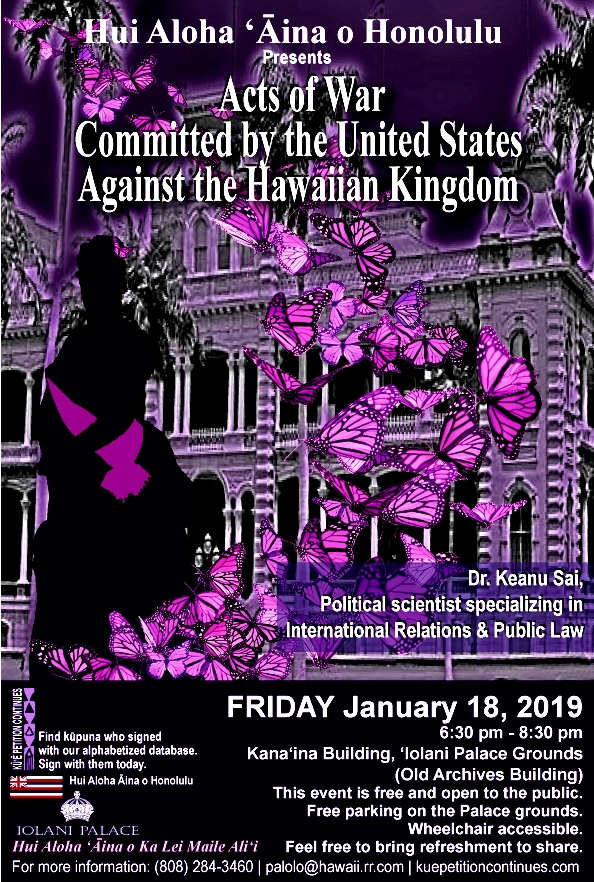
British Newspaper The Guardian: Hawai‘i Politician Stops Voting, Claiming Islands are ‘Occupied Sovereign Country’
Two days after celebrations of Hawaiian Independence Day took place throughout the Hawaiian Islands, the British Newspaper “The Guardian” published an article on Hawai‘i County Council Member Jennifer Ruggles titled Hawaii politician stops voting, claiming islands are ‘occupied.’
Important take aways from a good article.
- After the Guardian reporter reached out to the U.S. Department of State and State of Hawai‘i Governor for comment on Jennifer Ruggles’ position that war crimes are being committed throughout the Hawaiian Islands and on the memorandum of the United Nations Independent Expert to State of Hawai‘i Judges stating that the Hague and Geneva Conventions obligate the United States to administer Hawaiian Kingdom laws and not the domestic laws of the United States, both offices gave no comment. If Hawai‘i was not an occupied State, but rather legally a part of the United States, and that the Hague and Geneva Conventions don’t apply to Hawai‘i, the State Department and the Governor’s office would have surely stated that. Instead they gave no comment. When a government agency gives no comment it would imply that they cannot deny the facts of the story.
- Dr. deZayas statement that Hawai‘i is “formally” a part of the United States. Careful statement made because the word formally is defined as “pertaining to the outward aspect of something as distinguished from its substance or material.” Formally is not the same as legally.
- Spokesman from the United Nations Office of the Commissioner for Human Rights stated “They are [Dr. deZayas’] own views.” This is true because it was his view as United Nations Independent Expert before his term expired in April 2018.
- In his February 25, 2018 memorandum to the State of Hawai‘i, Dr. deZayas clearly stated, “currently serving as the UN Independent Expert on the promotion of a democratic and equitable international order, I have come to understand that the lawful political status of the Hawaiian Islands is that of a sovereign nation-state in continuity; but a nation-state that is under a strange form of occupation by the United States resulting from an illegal military occupation and a fraudulent annexation.”
- The Guardian reported, “Keanu Sai, a political science lecturer at the University of Hawaii and member of the Hawaiian Kingdom provisional government, says the unilateral annexation of Hawaii by passing a law was tantamount to the US passing a law annexing the UK or any other country. Sai said: ‘You can’t pass a law annexing a foreign country.'”
#ProtectedPersonsHawaii
#WarCrimesHawaii
Big Island Video News (BIVN): Ruggles Disappointed In Media Coverage
#ProtectedPersonsHawaii
#WarCrimesHawaii
U.S. Federal Court Acknowledges the Continuity of the Hawaiian Kingdom and U.S. Violations of International Law
When the United States Senate resumed its debate of senate bill no. 222 to provide a government for the Territory of Hawai‘i in 1900, there was an exchange between Senator William Allen of Nebraska and Senator John Spooner of Wisconsin that warrants special attention. Two years earlier, Senator Allen voted against the annexation of the Hawaiian Islands by congressional legislation.
 During the debate on July 4, 1898, Senator Allen said, “The Constitution and the statutes are territorial in their operation; that is, they can not have any binding force or operation beyond the territorial limits of the government in which they are promulgated. In other words, the Constitution and statutes can not reach across the territorial boundaries of the United States into the territorial domain of another government and affect that government or persons or property therein (31 Cong. Rec. 6635).”
During the debate on July 4, 1898, Senator Allen said, “The Constitution and the statutes are territorial in their operation; that is, they can not have any binding force or operation beyond the territorial limits of the government in which they are promulgated. In other words, the Constitution and statutes can not reach across the territorial boundaries of the United States into the territorial domain of another government and affect that government or persons or property therein (31 Cong. Rec. 6635).”
He continued to clarify, that the “power of acquiring additional territory, rests exclusively in the President and the Senate, that it is an executive power which in its very nature can not be exercised by the House of Representatives, and that the only method of exercising it is by treaty and not by joint resolution or act of Congress; and the case of Texas, when rightly understood, forms no exception to this rule; therefore an attempt to annex or acquire territory by act or joint resolution of Congress is in violation of the letter, spirit, and policy of the Constitution (id.).”
Consistent with his position in 1898, Senator Allen asserted on February 28, 1900, “I utterly 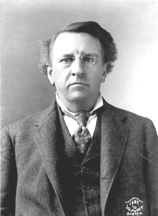 repudiate the power of Congress to annex the Hawaiian Islands by a joint resolution such as passed the Senate. It is ipso facto null and void (33 Cong. Rec. 2391).” If the annexation was null and void, then there would be no need to debate senate bill no. 222 that would establish an American government on Hawaiian territory. Senator Spooner response to Senator Allen was “that is a political question, not subject to review by the courts (id.).” He then reiterated, “The Hawaiian Islands were annexed to the United States by a joint resolution passed by Congress. I reassert…that that was a political question and it will never be reviewed by the Supreme Court or any other judicial tribunal (id.).”
repudiate the power of Congress to annex the Hawaiian Islands by a joint resolution such as passed the Senate. It is ipso facto null and void (33 Cong. Rec. 2391).” If the annexation was null and void, then there would be no need to debate senate bill no. 222 that would establish an American government on Hawaiian territory. Senator Spooner response to Senator Allen was “that is a political question, not subject to review by the courts (id.).” He then reiterated, “The Hawaiian Islands were annexed to the United States by a joint resolution passed by Congress. I reassert…that that was a political question and it will never be reviewed by the Supreme Court or any other judicial tribunal (id.).”
What did Senator Spooner mean that “it will never be reviewed by the Supreme Court or any other judicial tribunal.” He was referring to the “political question” doctrine. William Howard Taft acknowledged that Senator Spooner was “a great constitutional lawyer,” which is why he knew precisely what the political question doctrine was when he said it. Under this doctrine that was in use by American courts at the time, to include the United States Supreme Court, political questions were considered by the courts as factual determinations made by the executive and legislative branches. As such, these determinations, even if they were considered by the courts as unconstitutional, would bind the courts to accept them as conclusive. What Senator Spooner meant was no matter how illegal the annexation was, the American courts will have to accept it because Congress did it.
As an example, the U.S. Supreme Court in Williams v. Suffolk Ins. Co., 38 U.S. (13 Pet.) 415, 420 (1839) treated as binding on the court the executive’s determination that a given country was in control of foreign territory “whether the executive be right or wrong.” According to Nelson “an important branch of [the political question] doctrine operated to identify factual questions on which courts would accept the political branches’ determinations as binding.” See Caleb Nelson, Adjudication in the Political Branches, 107 Colum. L. Rev. 559, 592-93 (2007). Under this doctrine courts at the time did not question whether it had jurisdiction to resolve a political question “but rather enforced and applied the political branches’ determinations.” See Tara Leigh Grove, The Lost History of the Political Question Doctrine, 90 N.Y.U. L. Rev. 1908, 1963 (Dec. 2015).
Senator Spooner’s statement is not only telling but malicious. The federal government knew that the illegal annexation of Hawai‘i would be locked within the American political system under the political question doctrine and never see the light of day. This shows an intent on the part of the United States government to conceal the fact that the annexation of Hawai‘i by a joint resolution, as Senator Allen stated, was “ipso facto null and void.” The political question doctrine, however, would later be revamped by the United States Supreme Court in Baker v. Carr, 369 U.S. 186 (1962) that would ironically unlock the door in exposing the prolonged occupation of Hawai‘i and the violations of international law.
Moving away from the courts accepting the factual determinations of the political branches as binding, the Supreme Court would now assert a revised doctrine where the courts would deny it has jurisdiction to address a political question because that decision has to be addressed by either of the two political branches—the executive or legislative, not the judicial branch. The issue would no longer be the acceptance of the factual determinations made by the executive or legislative branches, but whether or not the courts have jurisdiction to hear the case. It would now become a question of whether a case was justiciable or non-justiciable. In other words, under the traditional doctrine where the courts did not dismiss as non-justiciable but rather enforced the political branches determinations whether they were “right or wrong,” the courts under the modern doctrine would dismiss as non-justiciable because there exists a political question.
Today the invoking of the political question doctrine in cases that have been filed in federal courts come by way of a motion to dismiss under Rule 12(b)(1) of the Federal Rules of Civil Procedure or done by the court’s own volition called sua sponte. Rule 12(b)(1) addresses subject matter jurisdiction, which is whether the court has jurisdiction to hear the case before it. Where a motion to dismiss on subject matter jurisdiction grounds would be filed is in a situation where a prosecutor is attempting to prosecute someone for murder in traffic court. A traffic court does not have subject matter jurisdiction to prosecute a murder case, another type of court does. Applying the modern political question doctrine, the American courts would say the proper jurisdiction is either with executive or legislative branches of government and not the courts.
Therefore, the court’s dismissal of the case because of a political question only addresses the jurisdictional question of whether the court can preside over the case and not the merits of the case. In fact, under the modern doctrine, when a court dismisses a case as a political question under Rule 12(b)(1), the court accepts as true the factual allegations in the complaint.
In 2008, the federal district court in Washington, D.C., dismissed a case concerning Taiwan as a political question under Rule 12(b)(1) in Lin v. United States, 539 F. Supp. 2d 173 (D.D.S. 2008). The federal court in its order stated that it “must accept as true all factual allegations contained in the complaint when reviewing a motion to dismiss pursuant to Rule 12(b)(1).” When this case went on appeal, the D.C. Appellate Court underlined the modern doctrine of the political question, “We do not disagree with Appellants’ assertion that we could resolve this case through treaty analysis and statutory construction; we merely decline to do so as this case presents a political question which strips us of jurisdiction to undertake that otherwise familiar task.” See Lin v. United States, 561 F.3d 506 (2009).
In 2018, federal judge Tanya S. Chutkan presided over Sai v. Trump—Petition for Writ of Mandamus, which sought an order from the federal court to compel President Trump to comply with the 1907 Hague Convention, IV, and the 1949 Geneva Convention, IV, by administering the laws of the Hawaiian Kingdom as an occupied State. The case was filed on June 25, 2018 with the United States District Court for the District of Columbia and assigned civil case no. 1:18-cv-01500.
The factual allegations of the complaint were stated in paragraphs 79 through 205 under the headings From a State of Peace to a State of War, The Duty of Neutrality by Third States, Obligation of the United States to Administer Hawaiian Kingdom laws, Denationalization through Americanization, The State of Hawai‘i is a Private Armed Force, The Restoration of the Hawaiian Kingdom Government, Recognition De Facto of the Restored Hawaiian Government, War Crimes: 1907 Hague Convention, IV, and War Crimes: 1949 Geneva Convention, IV.
On September 11, 2018, Judge Chutkan, on her own accord (sua sponte), issued an order dismissing the case as a political question. On the very same day the U.S. Attorney for the District of Columbia filed a “Motion for Extension of Time to Answer in light of the order dismissing this action,” but it was denied by minute order. Judge Chutkan stated, “Because Sai’s claims involve a political question, this court is without jurisdiction to review his claims and the court will therefore DISMISS the Petition.” By dismissing the complaint, the Court accepted “as true all factual allegations contained in the complaint.”
Under the traditional political question doctrine, the Federal Court would have accepted as true the annexation of Hawai‘i even though it wasn’t, but under the modern doctrine it accepted as true the “illegality” of the annexation as well as the violations of international law since the American invasion of the Hawaiian Kingdom on January 16, 1893.
For the first time since President Grover Cleveland, in his message to the Congress on December 18, 1893, presented the facts of the illegal overthrow of the Hawaiian Kingdom government, the United States government, through its federal court in Washington, D.C., accepted “as true” the facts of the prolonged occupation of the Hawaiian Kingdom and the commission of war crimes.
The proper venue for resolving the violations of international law is not with the executive or legislative branches of the United States government, but rather international bodies, which will include the International Commission of Inquiry in Incidents of War Crimes in the Hawaiian Islands—The Larsen Case (Hawaiian Kingdom – Lance Paul Larsen) under the jurisdiction of the Permanent Court of Arbitration. These proceedings stemmed from the Larsen v. Hawaiian Kingdom arbitration.
The United States has admitted to the violations of international law. Drawing from the Miranda warning, “Anything you say may be used against you in a court of law.”
Big Island Video News (BIVN): Ruggles Puts Hawaii Officials On Notice For Pillaging (Nov. 20, 2018)
#ProtectedPersonsHawaii
#WarCrimesHawaii
Council Member Ruggles Places the State of Hawai‘i on Notice for Pillaging Protected Persons
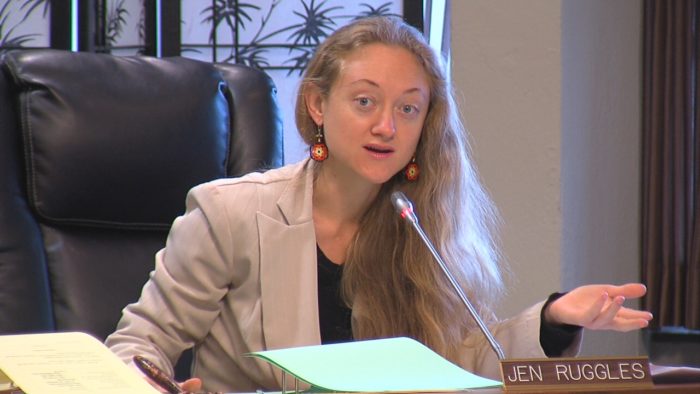 Council member Jen Ruggles released a letter today that she had sent to Governor Ige, every mayor, and every county taxation department in the State of Hawai‘i regarding “War crimes of pillaging committed against Protected Persons by the State of Hawai‘i and its Four Counties.”
Council member Jen Ruggles released a letter today that she had sent to Governor Ige, every mayor, and every county taxation department in the State of Hawai‘i regarding “War crimes of pillaging committed against Protected Persons by the State of Hawai‘i and its Four Counties.”
The letter begins by stating, “To my dismay, I have become aware of Hawai‘i’s status as a nation-state, under international law, which has been under an illegal occupation by the United States since it, by its own admission, illegally overthrew the Hawaiian Kingdom government on January 17, 1893.” Referring to President Cleveland’s 1893 address to the U.S. Congress where he declared U.S. had committed “an act of war” against the Hawaiian Kingdom, she writes, “these acts of war created a state of war between itself and the Hawaiian Kingdom…International law bound, and still binds, the United States to adhere to the law of occupation.”
Ruggles also referred to the United Nations Human Rights Office of the High Commissioner, Dr. Alfred de Zayas’ memorandum sent to Hawaii State judges this past February which stated Hawai‘i was “under a strange form of occupation by the United States resulting from an illegal military occupation and a fraudulent annexation.”
“After reading Dr. de Zayas’s memorandum,” Ruggles wrote, “I attempted to verify his claim of ‘a fraudulent annexation.’ It became apparent to me that there is no clear U.S. constitutional basis for the enforcement of United States law on Hawaiian Kingdom territory…As a Council member, I have come to understand that legislation is limited to the territorial jurisdiction of the law-making body. The U.S. Congress has no constitutional authority, nor any authority under international law, to unilaterally annex a foreign country by a joint resolution.”
Ruggles also noted that according to international law definitions, what is called the “State of Hawai‘i” is, in fact, an “organized armed force.” “The State of Hawai‘i cannot, therefore claim to be a lawful government because its only claim to authority derives from U.S. congressional legislation that has no extraterritorial effect,” Ruggles wrote, “The ‘State of Hawai‘i’ meets the jus in bello—the laws of war definition of an organized armed group acting for and on behalf of the United States within the territory of the Hawaiian Kingdom.”
According to Ruggles, because there is no evidence that Hawaii was ever legally made apart of the United States, the laws of occupation apply. These laws would include the Hague and Geneva Conventions, which are U.S. ratified treaties. According to Title 18, section 2441 of the United States Code, any breach to these treaties constitute “war crimes.”
Article 64 of the 1949 Geneva Convention mandates that the laws of the occupied territory must remain in force. Ruggles says these laws include the 1882 Hawaiian Kingdom Act To Consolidate and Amend the Law Relating to Internal Taxes which consists of poll, school, dog, horse, mule, road, and real and personal property taxes. Ruggles asserts that the State of Hawaii and the four counties collection of money from protected persons is a form of pillaging.
Black’s Law dictionary defines plunder as to “pillage or loot. To take property from persons or places by open force, and this may be in course of war…The term is also used to express the idea of taking property from a person or place, without just right.” The U.S. ratified Hague and Geneva Conventions specifically prohibit pillaging.
“This letter serves to give you both knowledge, and ‘awareness of the factual circumstances that established the existence of an armed conflict’ between the Hawaiian Kingdom and the United States, the application of the HCIV and GCIV, and the protection afforded aboriginal Hawaiians as protected persons,” Ruggles wrote, “Therefore, you must cease and desist from committing these war crimes unless the State of Hawai‘i transforms itself into a Military Government recognizable under international law”
Council member Ruggles concluded the letter with an excerpt from a report Dr. Keanu Sai had provided Governor Ige’s Chief of Staff, Mike McCartney in 2015 titled “Report on Military Government.” According to the report, the State of Hawaii is obligated to comply with U.S. Army Field Manual FM 27-5 and establish a military government to work with the acting Hawaiian Kingdom Government to provisionally serve as the administrator of the laws of the Hawaiian Kingdom.
During Ruggles’ October Town Hall she explained how she is doing her job “as mandated by her oath to uphold the U.S. Constitution that says treaties are the supreme law of the land through putting every agent of the United States in Hawaii concerning the rights of protected persons on notice for violations of the Hague and Geneva Conventions.”
Ruggles confirmed Governor Ige, Mayor Kim, Mayor Arakawa, Mayor Caldwell, Mayor Carvalho, Linda Chu Takayama, Lisa Miura, Mark Walker, Nelson H. Koyanagi, Jr., and Ken Shimonishi all received her letter on November 19th, 2018.
#ProtectedPersonsHawaii
#WarCrimesHawaii
Kamehameha Schools Midkiff Learning Center: Hawai‘i Sovereignty Symposium
NEA Teachers Union Published Third and Final Article on the American Occupation of Hawai‘i
As part of a three part series the National Education Association (NEA) has published the third and final article on the American occupation of Hawai‘i. The NEA is the largest labor union in the United States comprised of public school teachers, administrators, and faculty and administrators of universities. This third and final article is titled “The Impact of the U.S. Occupation on the Hawaiian People.”
The NEA’s article stems from a resolution that was passed by its delegates who met at their annual convention in 2017 in Boston, Massachusetts.
The resolution was introduced by the delegates of the Hawai‘i State Teachers Association, which is an affiliate labor union of the NEA, and it passed on July 4, 2017. The resolution was referred to as New Business Item 37, which stated:
“The NEA will publish an article that documents the illegal overthrow of the Hawaiian Monarchy in 1893, the prolonged occupation of the United States in the Hawaiian Kingdom and the harmful effects that this occupation has had on the Hawaiian people and resources of the land.”
#ProtectedPersonsHawaii
#WarCrimesHawaii

